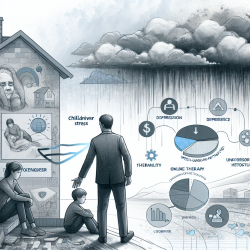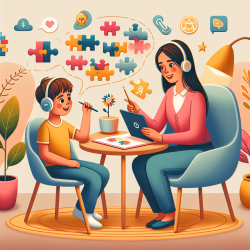Introduction
The COVID-19 pandemic has compelled many professions to adapt to remote work, including speech-language pathology (SLP). Drawing parallels from the research article "The COVID-19 Pandemic and Probation in Chile: Remote Supervision and Regional Differences," we can glean insights into how remote supervision can be effectively implemented in SLP, especially for children.
Research Insights: Remote Supervision in Chile
The study highlighted how Chilean probation officers transitioned from in-person to remote supervision, utilizing videoconferencing, calls, and text messages. This shift was necessitated by the pandemic and revealed significant regional differences in technology access and socioeconomic conditions.
Key findings from the research include:
- Probation officers adapted to remote supervision despite limited prior experience.
- Clients faced challenges with technology access, which varied significantly across regions.
- The pandemic exacerbated existing socioeconomic inequalities, affecting the implementation of remote supervision.
Applying Lessons to Speech-Language Pathology
SLP practitioners can learn from these findings to enhance remote therapy services for children. Here are some strategies:
- Assess Technology Access: Evaluate the technology availability of clients to ensure they can participate in remote sessions. This may involve providing resources or guidance on accessing necessary technology.
- Tailor Approaches Regionally: Recognize that socioeconomic and geographical factors can impact access and engagement. Customize approaches based on regional needs and resources.
- Focus on Equity: Address disparities by advocating for policies that support equitable access to remote therapy, ensuring all children receive the support they need.
Encouraging Further Research
While the Chilean study provides valuable insights, further research is needed in the context of SLP to explore the long-term effects of remote therapy on child outcomes. Practitioners are encouraged to participate in or initiate studies that examine:
- The impact of remote therapy on communication skills development in children.
- Strategies to overcome technology barriers in diverse socioeconomic settings.
- The effectiveness of remote supervision compared to traditional in-person methods.
Conclusion
Remote supervision in SLP, much like in Chilean probation practices, requires careful consideration of technology access, regional differences, and socioeconomic factors. By leveraging data-driven insights and continuing research, practitioners can enhance therapy outcomes for children in a remote setting.
To read the original research paper, please follow this link: The COVID-19 Pandemic and Probation in Chile: Remote Supervision and Regional Differences.










